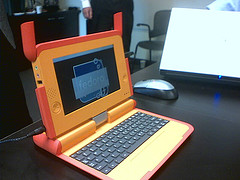The OLPC Wiki
OLPC News
The first working prototype of the $100 Laptop was unveiled at the Country Task Force Meeting, 23 May 2006. (See Flickr for more images.) This was first time we had combined the industrial design with the hardware (A-TEST board). Both the ID and the hardware had been shown separately in the past; pictured is the working laptop, completely self-contained, running Fedora Core 5.0.
One thing that might be somewhat misleading is the display; we plan to ship a display that is bigger and of a higher resolution than the one pictured. We plan to ship a 7.5-inch diagonal display with 1200×900 pixels vs. the 7.0-inch diagonal display with 800×480 pixels seen in the prototype. 786202892268287161371825
About One Laptop per Child
It's an education project, not a laptop project—Nicholas Negroponte
This is the wiki for the One Laptop per Child association. The mission of this non-profit association is to develop a low-cost laptop—the "$100 Laptop"—a technology that could revolutionize how we educate the world's children. Our goal is to provide children around the world with new opportunities to explore, experiment, and express themselves.
Why do children in developing nations need laptops? Laptops are both a window and a tool: a window into the world and a tool with which to think. They are a wonderful way for all children to learn learning through independent interaction and exploration.
What you'll find inside
A good place to start exploring this wiki is the One Laptop per Child page, which gives an overview of the project. There is a list of frequently asked questions (FAQ); a place to ask a question; and numerous pages on hardware, software, and content. There are also discussion pages on issues of deployment and country-specific discussions. An extended table of contents is also available.
About this Wiki
The purpose of this wiki is to both share information about the project and to solicit ideas and feedback. The articles and discussion vary from technical to epistemological. We invite comments on every page (please use the "discussion" tab at the top of each page). Please restrict edits to the article pages themselves to facts, not opinions. You are encouraged to sign your work and to make liberal use of citations and links. (Please feel free to make an account and please use ~~~~ as a signature for your comments.) Please note that pages that include the {{OLPC}} template—such as this one—are maintained by the OLPC team and are generally representative of the current state of the project. Other pages—created and maintained by the public—should be read with that in mind.
